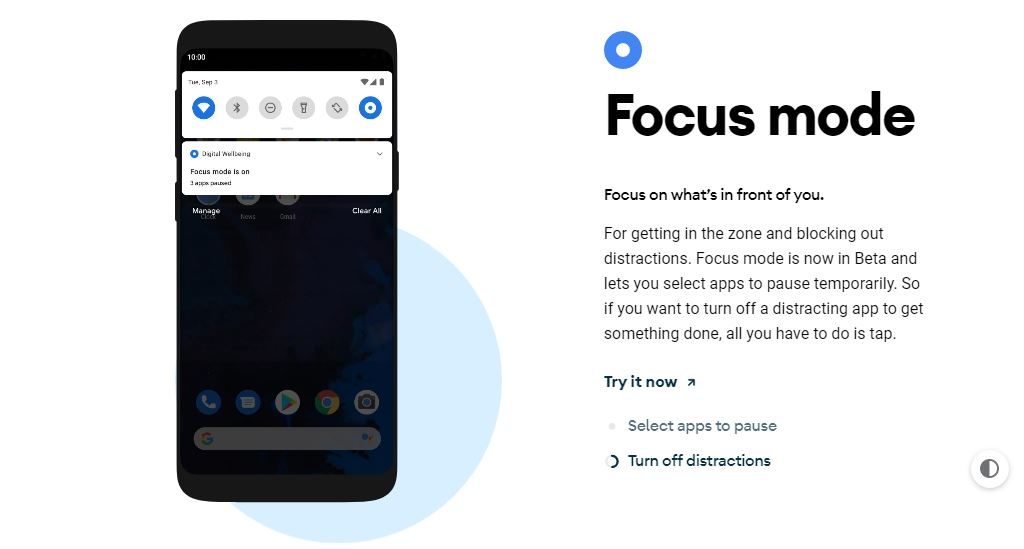Android 10, privacy and digital wellbeing

Google released, on 3 September 2019, the new version of its mobile operating system, Android 10, for now only available for selected smartphones. This update, “powered by on-device machine learning”, includes new features, among which are the dark theme, changes in privacy settings, and a Beta version of the app Digital Wellbeing, where one can find the Focus tool.
Biased and bayesed
According to Van Dijck and Poell:
“In March 2019, the European Commission fined Google’s parent company Alphabet Inc. 1.5 billion euro for antitrust violations in the online advertising market—the third fine in three years. In July 2018, European Commissioner Margrethe Vestager had levied a record fine of 4.3 billion euro on Google for breaching European competition rules by forcing cell phone manufacturers to pre-install a dozen of the firms’ apps when using Android—Google’s mobile operating system. And in 2016, the company was punished for unlawfully favouring Google Shopping services in the results of its own search engine.” (3)
Being a ‘work-in-progress’, as reported by The Verge, further hindered by the update problem since Google acts in a vast ecosystem of stakeholders (manufacturers, users, carriers), the result of the update release is that its full implementation seems far from being concretized, leaving behind the promised enhanced privacy protections. In addition, even for the ones who are able to install it, it still requires active and careful management of the opt-ins and opt-outs, for instance, to avoid geolocation tracking. Therefore, the concerns persist in regards to the respect for privacy, still left unresolved with Android 10, either due to ambiguities in system adjustments, as seen above, or simply because not everybody is willing to purchase a new (Google Pixel) phone.
Independently of the installed version, it is important to reflect on the following: Android is the operating system running on 2.5 billion active mobile devices (“What is Android”). On the other hand, Google is a ubiquitous infrastructure of “multi-sided platforms” (Van Dijck and Poell 3).
This situation signals what Van Dijck and Poell defend, the need to reframe platform power, and addressing the issue both taking on the perspective conveyed by Plantin et al. of “infrastructured platforms”, and acknowledging the material intervention derived from “institutional and organizational power” (Bratton 44), resonates as preeminent to broadly consider the implicit and explicit matters of interest based upon monetization for the purpose of market validation and not on societal prosperity, as it often is portrayed to be.

Image credit: screenshot taken from https://wellbeing.google/tools/ (21 September 2019)
Infrastructuralization
It is also interesting to explore the fact that Google is allowing people to act on finding their balance, in terms of their digital presence, with the Digital Wellbeing app and its tool Focus, when it seems that the current hyperbolized environment of attention-as-profit seeking is requiring ever-more varied strategies to capture attention and data, like experiments with ‘interactives’ (Netflix, Fortnite) and targeting customers via smartphones in a local context (Google Maps).
According to the Oxford English Dictionary, the word focus refers to concentration, whether of vision, light, sound, energy; and convergence towards a single point or place, a center.
Energy towards concentration of attention in getting work done or in spending time with family is, arguably, the rationale behind the app Digital Wellbeing and its tool Focus.
Or will the app and its Focus tool actually be experimenting behind the scenes, extracting data about which apps are being actively grayed out, at what time, and where, informing potential strategies on how to capitalize the scarce attention span?
An app walkthrough will reveal the several affordances of the Digital Wellbeing app and its tool Focus, particularly its vision, operating model and governance (Light, Burgess and Duguay 9) which is not what I propose to do here. Nonetheless, it is relevant to note the tacit acknowledgment by Google of the potential addictive habits associated with digital presence, and the encouraging of the users in dealing with that situation, assisted by the possibility of turning off notifications and being served infographics about screen time and app usage, enabling or constraining forms of user behavior (Bucher and Helmond 12). Is this not a contradiction, a continuation of the attention deficit (Rogers 5)?
Furthermore, there is an intention to mediate free will, an extension of “a ‘database of intentions’, one that saves one’s aims and plans prior to acting.” (Rogers 6). The users can by themselves act and decide about ignoring their mobile devices, but the app and tool seem to cement a dimension of perceiving that concrete possibility of exerting control through its use. This mediation of free will can be seen as extrapolating to other spheres of one’s actions, from a McLuhanian perspective: an extension of one’s self, becoming invisible and therefore becoming infrastructuralized. As Julieta Aranda, Brian Kuan Wood, and Anton Vidokle put it (2014):
“And in the meantime we are being faced with more and more—not just information, but the world itself. And a very particular world that has already become part of our consciousness. And it wants something. It doesn’t only want to harvest our eyeballs, our attention, our responses, and our feelings. It also wants to condition our minds and bodies to absorb all the richness of the planet’s knowledge. […] These distances are themselves very quickly reformatting our consciousness and cognitive capacity to absorb entire worlds made of contradiction—not only in language but far beyond language as well.”
Bibliography:
Bratton, Benjamin H. “Platform and Stack, Model and Machine.” The Stack: On Software and Sovereignty. Cambridge, Massachusetts and London, England: The MIT Press, 2015. 41-51.
Bucher, Taina, and Anne Helmond. “The Affordances of Social Media Platforms.” UvA-DARE (Digital Academic Repository). 2016. University of Amsterdam. https://pure.uva.nl/ws/files/9115828/BucherHelmond_SocialMediaAffordances_preprint.pdf Accessed 7 September 2019.
Davis, Jenny, and James Chouinard. “Theorizing Affordances: From Request to Refuse.”Bulletin of Science, Technology & Society 36.4 (2016): 241-248.
Fuchs, Christian. “A Contribution to the Critique of the Political Economy of Google.” Fast Capitalism 8.1 (2011): 31-50.
Light, Ben, and Jean Burgess & Stefanie Duguay. “The Walkthrough Method: An Approach to the Study of Apps.” new media & society 20.3(2016): 1-20.
McLuhan, Marshall, and Quentin Fiore. The Medium Is the Massage. London, England: Penguin Books, 1967.
McLuhan, Marshall. “The Medium Is the Message.” Understanding Media: The Extensions of Man. Cambridge, Massachusetts and London, England: The MIT Press, 1994. 7-21.
Plantin, Jean-Christophe, et. al. “Infrastructure Studies Meet Platform Studies in the Age of Google and Facebook.” new media & society 20.1 (2018): 293-310.
Rogers, Richard. “Aestheticizing Google Critique: A 20-year Retrospective.” Big Data & Society 5.1 (2018): 1-13.
van Dijck, J., Nieborg, D. & Poell, T. “Reframing Platform Power.” Internet Policy Review 8.2 (2019): 1-18.
Web Pages:
Bohn, Dieter. “Android 10 Review: New Gestures, Dark Theme, and Privacy Improvements.” The Verge, The Verge, 4 Sept. 2019, https://www.theverge.com/2019/9/4/20848251/android-10-review-dark-theme-focus-mode-gestures. Accessed 20 September 2019.
Bohn, Dieter. “Google Can’t Fix the Android Update Problem.” The Verge, The Verge, 4 Sept. 2019, https://www.theverge.com/2019/9/4/20847758/google-android-update-problem-pie-q-treble-mainline. Accessed 20 September 2019.
Burke, Dave. “10 Things to Know about Android 10.” Google, Google, 3 Sept. 2019, https://blog.google/products/android/android-10/. Accessed 21 September 2019.
“Mega-Trend: Attention Economy.” Trendone.com, 25 Mar. 2019, https://www.trendone.com/en/trend-universe/mega-trends/mega-trend-detail/attention-economy.html. Accessed 21 September 2019.
Oxford English Dictionary, nd, https://www.oed.com. Accessed 20 September 2019.
“The Internet Does Not Exist.” e-Flux, 2014, https://www.e-flux.com/books/66665/the-internet-does-not-exist/. Accessed 21 September 2019.
“What is Android.” Android, https://www.android.com/what-is-android/. Accessed 20 September 2019.
Front image retrieved from: https://www.flickr.com/photos/pyrosapian/3632762120